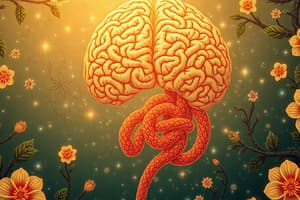Podcast
Questions and Answers
ما هو الدور الذي يلعبه محور الأمعاء-الدماغ في الظروف النفسية والنفسية؟
ما هو الدور الذي يلعبه محور الأمعاء-الدماغ في الظروف النفسية والنفسية؟
يسهم محور الأمعاء-الدماغ في تطور مشاكل الصحة النفسية والجسدية عن طريق التأثير على بعضهما البعض.
ما هي العلاقة بين الالتهاب والمشاكل الصحية النفسية؟
ما هي العلاقة بين الالتهاب والمشاكل الصحية النفسية؟
تم الربط بين الالتهابات في الأمعاء وتطور بعض الأمراض النفسية مثل القلق والاكتئاب.
ما هي العوامل النفسية التي يمكن أن تسهم في تطور الأمراض الهضمية؟
ما هي العوامل النفسية التي يمكن أن تسهم في تطور الأمراض الهضمية؟
العوامل النفسية مثل الضغط والقلق يمكن أن تؤدي إلى تطور أمراض الجهاز الهضمي.
ما هي النهج العلاجية التي أظهرت نجاحا في معالجة أمراض الجهاز الهضمي والمشاكل النفسية المرتبطة؟
ما هي النهج العلاجية التي أظهرت نجاحا في معالجة أمراض الجهاز الهضمي والمشاكل النفسية المرتبطة؟
ما المغزى من العبارة 'العلاقة بين الأمراض الهضمية والمشاكل الصحية النفسية إلى طريق مزدوج'؟
ما المغزى من العبارة 'العلاقة بين الأمراض الهضمية والمشاكل الصحية النفسية إلى طريق مزدوج'؟
Study Notes
Gut-Brain Axis and Digestive Diseases: A Closer Look
The relationship between the gut and the brain is a complex one, with both systems influencing each other in various ways. This connection, known as the gut-brain axis, has been found to play a significant role in the development of some mental health issues, particularly in the context of digestive diseases. In this article, we will explore the gut-brain axis, how it relates to digestive diseases, and the impact of these diseases on mental health.
The Gut-Brain Axis
The gut-brain axis is a bidirectional communication system that links the gastrointestinal (GI) system and the nervous system. This connection is established through the vagus nerve, which acts as a primary communication pathway between the brain and the GI system. The gut-brain axis plays a crucial role in maintaining the balance of the body's internal environment and regulating various physiological functions, such as digestion, appetite, and metabolism.
Digestive Diseases and the Gut-Brain Axis
Research has shown that various digestive diseases can have a profound impact on the gut-brain axis, leading to mental health issues. For instance, irritable bowel syndrome (IBS), a functional gastrointestinal disorder characterized by abdominal pain, bloating, and diarrhea or constipation, has been linked to anxiety and depression. Ulcerative colitis (UC), a chronic inflammatory bowel disease, has also been associated with psychological disorders, including anxiety and depression.
Mood Disorders and Digestive Diseases
Mood disorders, such as anxiety and depression, are often found in individuals with digestive diseases. One study found that approximately 60% of those who suffer from gastrointestinal disorders are also found to suffer from one of several psychiatric disorders. This association suggests that the gut-brain axis plays a role in the development of these mental health issues.
The Role of Inflammation
Inflammation, a key component of many digestive diseases, has been linked to the development of mental health issues. Dysbiosis and inflammation of the gut have been found to cause several mental illnesses, including anxiety and depression. This finding highlights the importance of maintaining a healthy gut microbiome to preserve both physical and mental health.
Psychological Factors
Psychological factors, such as stress and anxiety, can also contribute to the development of digestive diseases. For instance, stress can lead to functional GI disorders, causing symptoms such as abdominal pain and bloating. This connection further highlights the importance of addressing psychological factors when dealing with digestive diseases.
Therapeutic Approaches
Therapeutic approaches that target the gut-brain axis have shown promise in treating both digestive diseases and related mental health issues. Psychologically based interventions have been found to lead to greater improvement in digestive symptoms compared to conventional medical treatment alone. These interventions can include stress reduction techniques, cognitive-behavioral therapy, and mindfulness-based practices.
Conclusion
The gut-brain axis is a complex system that plays a significant role in both our physical and mental health. The relationship between digestive diseases and mental health issues is a two-way street, with both conditions influencing each other. By understanding this connection, we can develop more effective treatments and interventions that address both the physical and emotional aspects of these conditions.
Studying That Suits You
Use AI to generate personalized quizzes and flashcards to suit your learning preferences.
Description
Explore the intricate connection between the gut and the brain, known as the gut-brain axis, and its impact on mental health in the context of digestive diseases. Learn about the bidirectional communication system linking the gastrointestinal system and the nervous system, the association between digestive diseases and mood disorders, the role of inflammation, and therapeutic approaches targeting the gut-brain axis.




